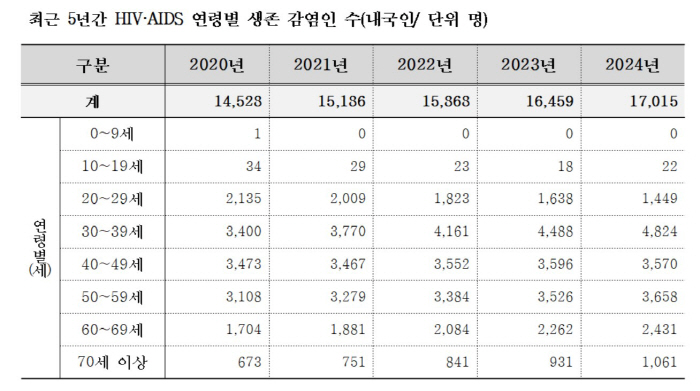The number of people infected with HIV increased by 17% in five years...Treatment Abandoned Need to Strengthen Public Responsibility for Survival of Infected Persons
|
According to data submitted by Rep. Seo Mi-hwa (Democratic Party of Korea), a member of the National Assembly's Health and Welfare Committee, from the Korea Centers for Disease Control and Prevention, the number of HIV (human immunodeficiency virus) and AIDS (acquired immunodeficiency virus) infections in Korea increased 17.1% over the past five years from 14,528 in 2020 to 17,015 in 2024. In particular, the number of infected people aged 70 or older increased by 57.7%.
The number of infections being treated also increased by 16.3% (13,767 in 2020 → 16,010 in 2023). However, infected people who have only received medical treatment and have not applied for benefits are omitted from national statistics, and there is a gap between the actual number of infected people and the figures identified by the Korea Centers for Disease Control and Prevention. When some infected people stop treatment or receive treatment abroad, the state has no way to grasp it, making it difficult to properly check even the minimum situation for establishing a support system for infected people.
The Korea Centers for Disease Control and Prevention also agrees on the need to manage those who give up treatment, but it is difficult to improve the system due to conflicts with personal information protection and social stigma. An official from the Korea Centers for Disease Control and Prevention said "Even if information disclosure is limited, the resistance of infected people may increase.""Institutional improvement, rather than unconditional tracking, should be premised.", he explained.
"Although HIV infection is an infectious disease that can enjoy general life expectancy with treatment, social stigma and institutional barriers are pushing the infected out of the system," Seo said", he pointed out. "Rather than seeing the infected as an object of control, it is necessary to change the system that the state reaches out to help them live healthy within the institutional sphere."It is also an important task to establish an accurate basic information system for infected people" he said.
Meanwhile, the Korea Institute for Health and Social Affairs has proposed a plan to include HIV-infected people in the criteria for disability recognition as 'immune organ disorder' or 'social disability'.
In response, Rep. Seo said, "Discussion on recognizing disabilities of HIV-infected persons is a necessary discussion in order to guarantee dignity and the right to life.""The basic information and management system should be reorganized into a structure in which the public is responsible.", he suggested.
This article was translated by Naver AI translator.




